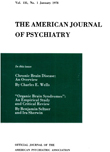Psychosis in a peasant society: social outcomes
Abstract
Several clinicians have theorized that somatic and residential treatments have an untoward effect on the eventual outcome of major mental illness. To test this hypothesis, the author studied social coping behavior of mentally ill people in Laos, a predominantly peasant society with no psychiatrists or psychiatric hospitals. The Lao folk term baa ("crazy" or insane) was used in determining cases. Social factors studied included legal problems, family contact, sociability, friendship, communal activities, sexuality, and work. Results indicated that levels of social function in this sample were quite limited. The author concludes that social disability associated with chronic psychosis cannot be ascribed totally to diagnostic labeling or institutionalization.
Access content
To read the fulltext, please use one of the options below to sign in or purchase access.- Personal login
- Institutional Login
- Sign in via OpenAthens
- Register for access
-
Please login/register if you wish to pair your device and check access availability.
Not a subscriber?
PsychiatryOnline subscription options offer access to the DSM-5 library, books, journals, CME, and patient resources. This all-in-one virtual library provides psychiatrists and mental health professionals with key resources for diagnosis, treatment, research, and professional development.
Need more help? PsychiatryOnline Customer Service may be reached by emailing [email protected] or by calling 800-368-5777 (in the U.S.) or 703-907-7322 (outside the U.S.).



